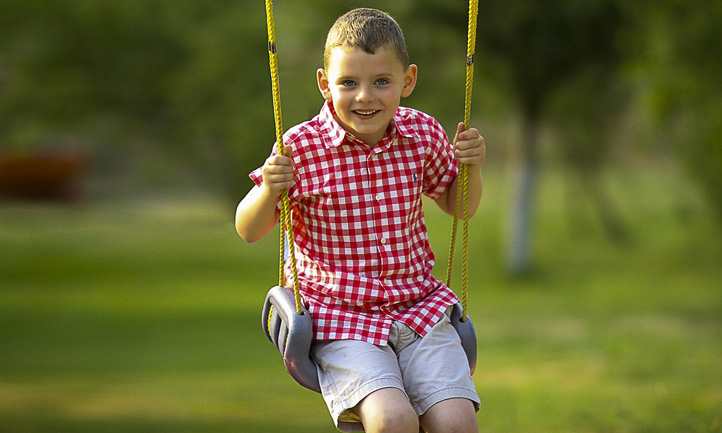Children’s Bereavement and Emotional Wellness, Part 1
Author: Andrea Hug
I vividly remember when my husband died. My children were four, two, and four months old. I hardly knew how to be a parent, let alone a sole parent to bereaved children. I remember going to see a counselor and saying, “What do I need to know to help these children grow up to be happy, healthy, productive members of society?” Now, 18 years later, I offer to you what I have gleaned over these past years.

First, it is helpful to have a working knowledge of the normal developmental stages. Knowing that each of us goes through stages at approximately the same time in our lives helps to evaluate if we are on track. Throughout our lives we lean on the lessons learned from the previous stages, and each stage becomes a building block for the one to follow. The following descriptions are meant as a guide, and you should always check with your pediatrician to assess appropriate milestones.
- From birth to 18 months old a child is learning to trust a caregiver. If consistent care and appropriate responses are not provided, a child learns mistrust.
- From 18 months to 3 years a child is gaining autonomy—mastering skills such as walking, grasping, and potty training. Without mastering this, a child learns to feel shame and doubt.
- From 3 to 6 years of age a child is beginning to learn independence. In this age bracket the child starts branching out and exploring outside the home. With success, this can cause a child to gain initiative and confidence, but without mastering the task, it raises feelings of guilt.
- Between the ages of 6 and 12, a child deals with the demand to learn new skills. Early days in school will provide success, and thus a child grows in confidence. Without success, a child begins to feel inferior to his or her peers.
- From 12 to 18 years old, the child’s peers are very important since teens achieve a sense of identity through the interactions with their peers. Questions involving occupation, sexuality, politics, and religion are explored, with peers influencing how a teen identifies himself. Mastering this task is important to a child’s ability to direct his or her path in life. Often this is when a child decides to go to college or learn a trade. Without mastery, confusion and depression may creep in.
How well a child comes through these stages affects their emotional wellness—the ability to regulate feelings and form close, secure, interpersonal relationships. Emotional wellness basically means that a child plays well with others. This influences how a child makes decisions and how they behave.
When children have a significant loss it can impact them so deeply that it causes them to regress to a previously mastered stage. For example, shortly after my husband died, my two-year-old daughter needed to use a pacifier again after not using it for several months. The pacifier offered her safety which she trusted. Her regression to that place of comfort also reminded her that she could trust even though her world was chaotic. To support her, I needed to offer additional hugs and comfort her more frequently before she could feel settled enough to give up the pacifier. Children may revert back to bedwetting or other less mature habits. A child who is 10 may not have the confidence that he used to have and may pull away from his peers rather than engaging with them because he doesn’t feel as smart or as good at a skill. By high school, a child’s emotional wellness can affect who they choose as friends and their future career choice.
It is important to remember that bereaved children must go through their losses very differently than an adult does. At each developmental stage they must reconcile the loss in new ways. This may sound overwhelming, but as parents we naturally companion our children through their developmental stages. We explain life to them in a way they can understand. Explaining the circumstances of the loss will be no different. What is important is to recognize the developmental stage of your child when the loss occurred. Be aware that the loss may cause the child to revert to the previous developmental stage, so offer comfort and gentle companioning while your child is learning to cope with the loss.
Because of your child’s profound loss, his or her self-esteem may be affected. Self-esteem is fostered through the affirmation and positive regard received in daily interactions throughout a child’s lifetime. For a bereaved child, positive esteem grows when a parent focuses on what the child is good at and helps him or her transfer those skills to other areas, like grief.
Focusing on important issues as you offer care to your children will help them move through their loss and incorporate the loss into their lives. I offer here some suggestions that can help them process their grief.
Help your child understand his or her own temperament.
A child may be quiet or outgoing. He may need stimulation from outside or he may be able to use his imagination to manage his time. Your child may naturally know that as he reads he will learn how to manage the pain or have the ability to soothe himself. Other children need to feel that constant comfort from a close family member. Because you know your child, you are the ideal person to help your child understand his temperament and learn what would help to ease the pain.
Put yourself in your child’s place and imagine what he or she is feeling.
Often we project how we feel, and imagine that our children are processing the loss the same way we are. I remember one day feeling really awful the entire day and thinking my child should as well. But my child was only four years old, and she could only tolerate her pain for a few moments at a time. On the other hand, I was also guilty of thinking that my child might not feel so bad since she was so little when her father died. These are examples of how I did not put myself in my child’s place and imagine how she was feeling.
Clarify the situation together and brainstorm solutions.
Children intuitively know what they need. Listen to them for their practical ideas about how to find solutions.
Take time to relax or play together.
It is important to remember that you love each other and hold precious memories in common. Having fun by watching a movie, playing a game, or ordering a pizza together reminds you that there is still joy in life.
Stick to a routine.
Routines create safety. A child knows what comes next and can manage time when there is a routine.
Build resilience.
Resilience is the new buzz word. Basically it means how a person bounces back after trauma. Dr. Kenneth Ginsburg has identified seven C’s of resilience including competence, confidence, connection, character, contribution, coping, and control. Visit www.healthychildren.org for many good articles including Dr. Ginsburg’s informative article titled “Building Resilience in Children.” Hover on the Healthy Living tab and click on Emotional Wellness.
Recognize that it takes time to heal.
There are healthy ways to process grief. Helping your child be resilient takes attention and love. You offer this already. Recognizing the developmental stages that your child faces helps you respond appropriately to your child. As you companion them, remember that their loss may be influencing their behavior. Even 10 years after the loss, a child will be significantly affected by the death of a loved one.
In our next article, we will look at practical things you can do for bereaved children to help them develop emotional wellness to carry through adulthood.
 By Andrea Hug, MaPC, MPS, LCPC: Andrea Hug is the surviving spouse of Lieutenant Christian A. Hug, USNR, a search and rescue helicopter pilot who died in 1993. She holds master's degrees in both Pastoral Counseling and Pastoral Studies from Loyola University in Chicago, and is a Licensed Clinical Professional Counselor. She worked for two years with TAPS Adult Survivor Care Team, having spent the previous six years working in hospice with young surviving widows and children.
By Andrea Hug, MaPC, MPS, LCPC: Andrea Hug is the surviving spouse of Lieutenant Christian A. Hug, USNR, a search and rescue helicopter pilot who died in 1993. She holds master's degrees in both Pastoral Counseling and Pastoral Studies from Loyola University in Chicago, and is a Licensed Clinical Professional Counselor. She worked for two years with TAPS Adult Survivor Care Team, having spent the previous six years working in hospice with young surviving widows and children.
